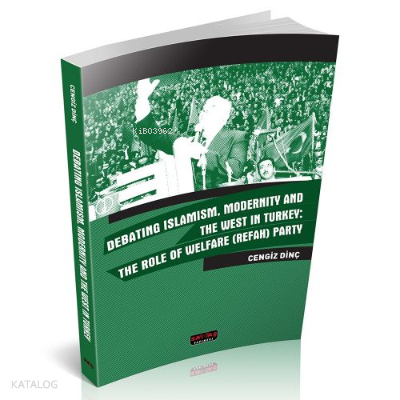9786052328668
569399

https://www.sehadetkitap.com/urun/debating-islamism
Debating Islamism
157.45
This study focuses on the Welfare Party elite's conceptualisation of modernity during the party's last 4-5 years before its closure in 1998. Since the party was the most important Islamist organisation in Turkey, it was at an important point of interaction between Islamism and modernity. The study tries to determine the significance of the WP discourse on key modernisation issues by answering such questions as how the WP elite conceptualised modernity; how this conceptualisation was formulated, constructed and what was modernity's relationship with the West in their view. It argues that, the WP elite had a distinct (Islamist) understanding of modernity which, despite its differences in its approach to some basic issues (e.g. secularism) overall remained within modernity by sharing most of its major characteristics. The WP elite, similar to many other Islamist movements, advocated a more Islamic (less secular and less Westernising) route to modernity; and they could not be considered as anti-modernists. The study contributes towards a better understanding of the critical role that a version of Islamism plays in Turkey's politics and process of modernisation and provides insights about the impact of Western modernity on the sizeable Islamist section. The study employs important concepts such as secularisation, nationalism, the modern state, economic development (science, technology, industrialisation), capitalism and democracy as important components of modernity. An analysis of the views of the WP elite with regard to these concepts and processes serves to better understanding the Islamist stance towards the particular path of modernisation in Turkey, modernity in general, and also the West.
This study focuses on the Welfare Party elite's conceptualisation of modernity during the party's last 4-5 years before its closure in 1998. Since the party was the most important Islamist organisation in Turkey, it was at an important point of interaction between Islamism and modernity. The study tries to determine the significance of the WP discourse on key modernisation issues by answering such questions as how the WP elite conceptualised modernity; how this conceptualisation was formulated, constructed and what was modernity's relationship with the West in their view. It argues that, the WP elite had a distinct (Islamist) understanding of modernity which, despite its differences in its approach to some basic issues (e.g. secularism) overall remained within modernity by sharing most of its major characteristics. The WP elite, similar to many other Islamist movements, advocated a more Islamic (less secular and less Westernising) route to modernity; and they could not be considered as anti-modernists. The study contributes towards a better understanding of the critical role that a version of Islamism plays in Turkey's politics and process of modernisation and provides insights about the impact of Western modernity on the sizeable Islamist section. The study employs important concepts such as secularisation, nationalism, the modern state, economic development (science, technology, industrialisation), capitalism and democracy as important components of modernity. An analysis of the views of the WP elite with regard to these concepts and processes serves to better understanding the Islamist stance towards the particular path of modernisation in Turkey, modernity in general, and also the West.
Yorum yaz
Bu kitabı henüz kimse eleştirmemiş.

















